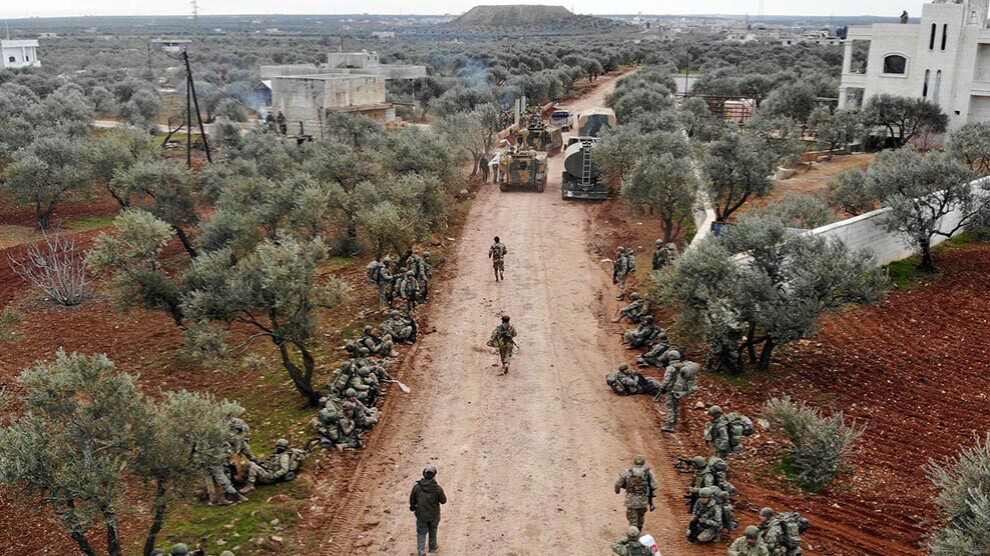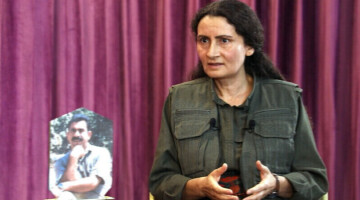The Turkish state is systematically committing war crimes in the occupied territories of Syria under the eyes of the world public. In an interview with ANF, the Deputy Co-Chairman of the Autonomous Administration of North and East Syria, Bedran Çiya Kurd, has commented on Turkey's involvement in the Syrian conflict and its war crimes in the occupied territories.
The Turkish State's Proxy Militias
Çiya Kurd summarizes the development of the crisis in Syria in 2011 in the following words: "The Syrian crisis of 2011 arose because of the political system of the Baath regime. Syrian society rebelled against this policy and fought for its legitimate demands. Turkey acted very calculatingly from the very beginning of the crisis. It intervened directly in Syria's internal politics, trying to steer the country's course in its own interests and build a power base there. Turkey's means of doing this were the Islamist groups that it supplied.
At the same time, Turkey opened its borders and airports to those who wanted to join Islamist groups. These groups were organized by Turkey. In this way, radical organizations such as Al-Qaeda, the Al-Nusra Front, the ISIS, etc. were organized and members were sent to Syria via Turkey.
Turkey has prevented a democratic development
Turkey wanted to make an Islam corresponding to its ideas, ideology and mentality effective against the Baath regime. Interestingly, until 2011, there was a friendly relationship between Turkey and the Baath regime. But as soon as the Syria crisis began, the Baath regime was declared the cruelest enemy. Thus, Syria's former friend became a bitter enemy from one day to the next. Turkey, with the help of the Islamist groups, blocked any democratic development. It tried to prevent the Kurds from benefiting from developments in Syria. At the same time, it wanted to use Syria's economic opportunities for itself."
Regime of robbery and plunder
Bedran Çiya Kurd speaks of a "regime of robbery and plunder" installed by the Turkish state. As a "fundamentalist and racist regime," Turkey wanted to make Syria a place where it could implement its own projects, he said and continued, "The government in Ankara tried to grow politically powerful here and at the same time strengthen itself economically because the country was in a major economic crisis and had major economic problems. For this reason, the Turkish state wanted to use Syria's resources to stabilize its own rule."
This is the character of the AKP/MHP regime, according to Çiya Kurd who pointed out that Turkey's policy in the Mediterranean regions is shown in the form of plundering all the wealth. "It threatens Cyprus and Greece for natural gas and sends troops to Libya to get access to oil there. In Iraq and Syria, Turkey's main goal is to gain control over resources. Here, the AKP/MHP regime has already stolen and sold everything it could get its hands on. Everything has been organized toward this goal. Turkey's interests were implemented through al-Nusra, the ISIS, and the Islamic Turkestan Party. These groups established a regime of looting and robbery in the regions they occupied with Turkish support."
1,000 factories looted in Aleppo
As is known, before the crisis, Turkey made some important steps in Syria in the industrial and commercial field, especially in Aleppo. The city was considered an economic hub and was particularly important as an industrial and commercial center. "Therefore, with the outbreak of the war, Turkey targeted Aleppo in particular. It tried to steal all the industry here. According to our data, 1000 factories in Aleppo were looted and completely taken to Turkey. The mercenary groups linked to Ankara caused about $100 billion worth of damage in the region between 2012 and 2016. In addition, Turkey destroyed about 80 percent of the places it could not reach directly," Çiya Kurd explained.
Rails near Idlib torn out and sold
In Idlib, the invading forces tore out the railroad tracks and sold them in Turkey. In fact, all the areas where the Turkish state advanced were dominated by theft. According to the Autonomous Administraion calculations, these lootings in Syria brought the Turkish budget revenues of tens of billions of dollars annually.
Abduction and ransom after nothing left to take
"After the Turkish troops and their mercenaries looted the factories in Aleppo and there was nothing left to take, they started kidnapping well-off or rich people and extorting ransoms. This practice, which was regularly encouraged by the Turkish state, became the main source of income for the mercenary groups. The four years that the Turkish state was in Aleppo became a time of greatest destruction and looting," summarized Çiya Kurd.
Cultural genocide
In March 2018, the NATO partner's army, with the help of a jihadist invasion force, occupied the hitherto self-governing canton of Afrin, which was predominantly inhabited by Kurds. Afrin was particularly famous for its agricultural products, especially olives. Çiya Kurd described the consequences as: "From the occupation of Afrin until today, the looting regime there has not come to an end. It is known to everyone that robbery and looting, destruction, cultural genocide and targeted demographic change are taking place in Afrin. The Turkish state is committing the crime of genocide here.”
Robbery of olive products
As is known, hundreds of thousands of olive trees were cut down. The Turkish state confiscated both Afrin's olives and oil. Both are brought to Turkey and sold from there to European countries. From this robbery alone, $80 million a year flows into the Turkish treasury.
Historic properties looted and sold
About 25 historical sites have been looted. This cultural theft continues permanently by the Turkish military, intelligence service and mercenary groups. A destruction of history is taking place in Afrin. Turkey has turned Syria and Iraq into a bubbling source for the theft of historical objects. Everywhere Turkey goes, whether in Afrin, Serêkaniyê, Girê Spî or Idlib, crimes are being committed against history. These crimes are carried out by the ISIS or al-Nusra. In this way, the historical objects are brought to Turkey. The market of Antep is known as a place where the historical objects from Syria and Iraq are sold. The Turkish state is behind this trade and it takes place under Erdoğan's direction and control. Millions are earned in this context."
"Turkey traded Syrian oil"
Çiya Kurd also recalled Turkey's trade in oil looted from Syria and Iraq by ISIS: "When Raqqa and Deir ez-Zor were under ISIS rule, the region's oil was brought to Turkey via Idlib in tankers. This oil trade saved Turkey a lot of money."
Turkey meets about 70 percent of its oil needs from outside. For this reason, it has intensively expanded the routes to use looted oil from Syria. Ankara tried to do this officially under various guises, Çiya Kurd said. "As is known, Erdoğan declared in 2019 at an intergovernmental meeting that a security zone would be established in northern Syria, where three million Syrian refugees would be settled. He called for control of Syria's oil wells so that the revenues could be spent on Syrian refugees. Erdogan is blatantly and officially stealing Syrian oil. Turkey also profits from European countries by using Syrian refugees as political leverage. In this context, the regime has received a lot of money from Europe over the years, cementing its power. This is a serious problem because the AKP/MHP has become a serious problem in Turkey."
"First occupation, then looting"
The Turkish government's goal and plan are clear: "It's all about occupation," said Çiya Kurd and noted that Turkey will not be satisfied with Syria alone, but will also invade other regions and states. "The Turkish state wants to establish a system of theft and plunder in the territories it occupies. The looting of history is also taking place within this framework. The regime wins everyone, especially the society in Turkey, by different means and methods. It is then always said that the country invaded Syria and Iraq 'to ensure national security'. At the same time, they want to 'support the Syrian opposition'. At the same time, the Turkish state is supporting mercenary forces, and doing so fraudulently. Behind all this rhetoric is a regime of theft and plunder. Behind it are Erdoğan, his family and their entourage. We can speak of an official mafia organization of Turkey."
"Use of banned weapons"
Çiya Kurd confirmed reports of the use of banned weapons by the Turkish state and its mercenary forces: "Turkey armed these gangs and sent trucks with weapons to Syria under the guise of humanitarian aid to them. Chemical and other banned weapons were seen in the hands of these mercenaries. These weapons were used against the people of Aleppo and Afrin. Sarin gas was used in Sheikh Maqsoud in Aleppo. This has been confirmed. To this day, some people are suffering from the consequences of use of chemical weapons. Many journalists have stated that the weapons and military equipment were brought to Syria to create chaos. New footage on SADAT [Turkish state mercenary company] shows that it was personally involved. That is a fact. What the AKP/MHP regime is doing in Syria is nothing less than a continuation of the practice of ISIS. Turkey has given weapons to ISIS, al-Nusra and their current successors, committing genocide in the region. Those responsible for these groups and those who have committed these crimes should be brought before international courts. The crimes range from theft to genocide, crimes against humanity, and war crimes.”
"We passed on the evidence"
Çiya Kurd continued, “Regarding Erdoğan's theft and looting in Aleppo, the genocide, and the active alteration of the demographic structure of Afrin, we, as the autonomous administration, forwarded many files and documents to international institutions and the states concerned. We wanted those responsible, especially Erdoğan and his mercenaries, to be prosecuted. At the same time, the occupied territories of Afrin, Girê Spî and Serêkaniyê are on our agenda. We still have a long way to go. What has happened and continues to happen here must be comprehensively settled.
Not only the people in the region who are suffering under Turkish policy should stand up against it. Everyone should. The powerful states, the international powers and the United Nations must stand against this Turkish occupation policy. With it, Turkey threatens the peace, security and existence of the people in the entire region. Ankara is preventing the region's problems from being resolved through dialogue. That is why Turkey must be held accountable."














